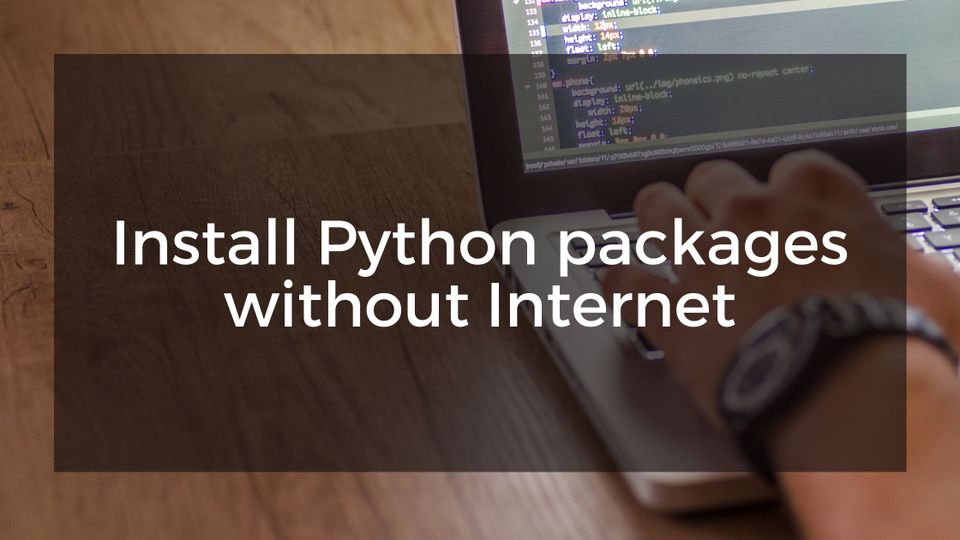How to Install Pip Packages Without Internet (Offline Pip Installation Guide)

Python developers rely on the simplicity and power of the Python Package Manager, commonly known as PIP. It's a crucial tool for setting up any development environment, facilitating the seamless installation of essential Python dependencies for your applications.
However, there's a catch – PIP typically downloads and installs packages from the internet, specifically from the Python Package Index (PyPI). But what if you find yourself in an environment without internet access?
In this guide, we'll navigate the world of offline pip package downloads, ensuring that Python development remains uninterrupted, even when an internet connection is nowhere to be found. Explore the solutions that empower developers to harness the full potential of PIP, regardless of internet availability.
Why Install Python Packages Without Internet?
Installing Python packages when you have internet access is a breeze – just employ the 'pip install' command, and it takes care of the rest. This command seamlessly retrieves packages from the Python Package Index (PyPI), builds them, and installs them, tailored for your specific machine.
PyPI offers an alternative in the form of wheel files. These wheel files can be downloaded and then installed offline on machines without internet connectivity, ensuring you can keep your Python environment up to date. It's important to note that you should download wheel files compatible with your machine's architecture, whether it's Windows or Linux.
But what about situations where internet access is restricted, especially in production environments? Here, you have two pragmatic options at your disposal:
- Downloading and Transferring Required Packages: In scenarios where internet access is constrained, you can manually download the necessary packages and then transfer them to the target machine for installation.
- Setting Up a Local PIP Repository: Alternatively, you can establish a local PIP repository. This approach ensures that your packages are readily accessible within your restricted environment, simplifying the installation process and minimizing dependencies on external internet connections.
Download using pip download
For downloading python packages you need python package manager PIP. It will get installed with python-pip utility, you can check handy pip commands to get started with it.
You can directly download required packages to some directory on machine which is having internet access and transfer these packages to production machine and install required packages from directory with all dependencies.
Make sure that you download packages on environment with similar architecture as of target.
To Simply download single package you can use:
# Download boto3 and it's dependencies in same directory
pip download boto3
# Download boto3 in mypackage directory
pip download boto3 --dest ./mypackageDownload Single PIP Package
If you use --dest parameter all packages and it's dependencies will get downloaded to mentioned directory.
Download all the packages in requirement file:
# Download boto3 and it's dependencies in same directory
pip download -r requirements.txt
# Download boto3 in mypackage directory
pip download -r requirements.txt --dest ./mypackageFor installation on offline machine you can use pip install with find-links option:
pip3 install --no-index --find-links=./downloads boto3Download using pip wheel
There is also an alternative way to download pip packages using wheel command.
- Download all required packages with dependencies using PIP
# Download wheel packages for django and it's dependencies
python -m pip wheel --wheel-dir <DIRECTORY> django
# Download all packages in requirements.txt file
python -m pip wheel --wheel-dir <DIRECTORY> -r requirements.txt- Transfer directory to target machine and install required packages from it using
--find-linksand--no-indexoption:
# Install Django Package
python -m pip install --no-index --find-links=<DIRECTORY> django
# Install all packages from requirements.txt file
python -m pip install --no-index --find-links=<DIRECTORY> -r requirements.txt
Setup Local PIP repository
For enterprises there may be need to setup and use local repository for their internal development as well as for maintaining external packages without internet access.
For setting up local repo you can use any artifactory such as Jfrog/Nexus and upload all required packages to the artifactory. Once uploaded you can use same artifactory all over your organization by configuring index url as artifactory url.
You can setup index-url in /etc/pip.conf file which is global configuration file for all users on the machine. Also XDG_CONFIG_DIRS environment variable can be used to find pip.conf file.
[global]
index-url = https://<your artifactory url>Once index-url is set all PIP packages can be deployed from this repository.
Concluding Thoughts
In this guide, we've unveiled essential strategies for Python package management in diverse environments. From downloading and transferring packages to setting up a local PIP repository, you're now well-prepared to handle dependencies effortlessly. With PIP as your trusty companion, adapt these solutions to your needs, and ensure smooth Python development, regardless of internet access constraints. Happy coding!
Member discussion